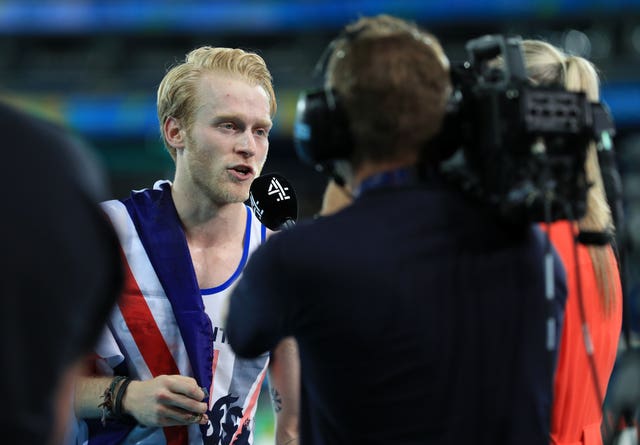Wearing masks during medal ceremonies and daily coronavirus testing have been mandated in new guidance for athletes attending the Tokyo 2020 Olympic and Paralympic Games.
The Japanese capital has re-entered a state of emergency until at least May 11 owing to a rise in coronavirus infections, and on Wednesday updated Covid-19 protocols for athletes – the so-called playbook – was published.
Quarantining for three days after the day of arrival is essential, while there is guidance on how athletes get around, train, eat and even fulfil media obligations.
Building on February's publication, the new Playbooks provide more specific details to @Tokyo2020 participants on COVID-19 countermeasures based on science and benefiting from learnings gathered during the evolution of the pandemic.https://t.co/PLJuUi2il7
— IOC MEDIA (@iocmedia) April 28, 2021
A decision on how many – if any – Japanese spectators will be able to attend venues will be taken in June, with overseas fans already barred from entering the country.
Athletes will not need to have been vaccinated, but face a strict testing regime throughout their stay.
They will, in principle, be tested for Covid-19 on a daily basis "to minimise the risk of undetected positive cases that could transmit the virus", a joint statement from the five key organising bodies said.
All other Games participants will be tested for the first three days after their arrival in Japan and "regularly" thereafter, with the frequency determined by their level of close proximity to athletes.

All participants are required to take two tests before flying to Japan within 96 hours of their departure time.
Games participants are urged not to deviate from their activity plan, and must present a copy of a written pledge which states that Tokyo 2020 takes responsibility for ensuring their compliance on entry to Japan. Visitors are advised to minimise contact within one metre of any Games participants who have already been in Japan for more than 14 days and local residents.
Everyone involved must exclusively use dedicated Games vehicles and refrain from using any other form of public or private transport. Once on board the vehicles, passengers must refrain from conversation, the guidance states.
Food should only be eaten in catering facilities at Games venues, the participants' accommodation or in their rooms using room service or an outside delivery.
The five parties today agreed on measures to ensure the safe organisation of @Tokyo2020 :1⃣ Updated COVID-19 countermeasures addressing new strains and the evolving situation2⃣ Decision on venue capacity to be made in June following government's guidancehttps://t.co/mh8EoBkWOp
— IOC MEDIA (@iocmedia) April 28, 2021
The initial playbooks for non-athlete Games participants were released in February, and a third version will be published in June. Christophe Dubi, the executive director of the International Olympic Committee (IOC), warned measures could be tightened still further if required.
"We are confident that compliance with these regulations will ensure the safety and security of athletes, Games officials and spectators, as well as the people of Tokyo, other host locations and Japan," the statement from the Tokyo 2020 organising committee, the IOC, the International Paralympic Committee, the Tokyo metropolitan government and the national government said.
Page 33 of the playbook states that masks must be worn by athletes at medal ceremonies, and by those presenting the medals.
The playbook advises against spending unnecessary time in a single space, and against entering into conversations in confined spaces such as lifts.
Interviews between athletes and media in the mixed zone will be limited to 90 seconds, with boom microphones being used to ensure a two-metre distance between journalists and athletes.

All visitors to Japan must have a smartphone and download two apps: one for health reporting and a contact confirming (COCOA) app.
The first is still under development and is set for release by the Japanese government in June. It must be downloaded by visitors before they enter the country.
The COCOA app alerts users if they come into close proximity with someone infected with Covid-19.
Non-compliance with the playbook will lead to disciplinary action, and an athlete who intentionally refuses to take a test when requested could face expulsion from the Games.
Dubi said: "These Games for all of us will be different but they reflect the sign of the times.
"Of course there will be a number of restrictions but speaking to all the groups within the Olympic movement no one ever said this will be a problem.
"Everybody is saying the more precise and stricter (the rules) the better, for one reason – safety first, for Japanese people and all participants."
Organisers faced questions over whether the intensive testing programme put Games participants in a privileged position when getting a test without symptoms in Japan remains difficult.
Tokyo 2020 delivery officer Hidemasa Nakamura said: "With frequent testing we will be minimising the formation of clusters.
"If we create clusters a lot of medical resources will have to be concentrated into this situation and we may pressurise the medical system in Japan. In order to prevent that, we will have frequent testing."
/https%3A%2F%2Fsportsmole-media-prod.s3.gra.io.cloud.ovh.net%2F22%2F25%2Fnikita-mazepin.jpg)
/https%3A%2F%2Fsportsmole-media-prod.s3.gra.io.cloud.ovh.net%2F23%2F08%2Feilanh.jpg)
/https%3A%2F%2Fsportsmole-media-prod.s3.gra.io.cloud.ovh.net%2F22%2F51%2Flyu-xiaojun.jpg)
/https%3A%2F%2Fsportsmole-media-prod.s3.gra.io.cloud.ovh.net%2F24%2F46%2Fjude-bellingham.jpg)
/https%3A%2F%2Fsportsmole-media-prod.s3.gra.io.cloud.ovh.net%2F24%2F49%2Fcharlotte-dujardin.jpg)
/https%3A%2F%2Fsportsmole-media-prod.s3.gra.io.cloud.ovh.net%2F24%2F36%2Fhannah-cockroft.jpg)
/https%3A%2F%2Fsportsmole-media-prod.s3.gra.io.cloud.ovh.net%2F24%2F35%2Fpoppy-maskill_1.jpg)